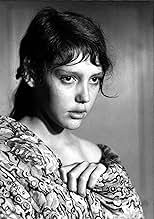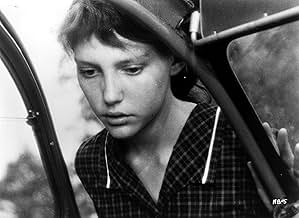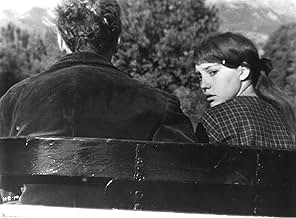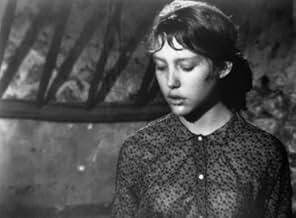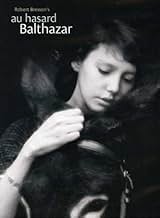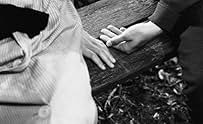IMDb रेटिंग
7.7/10
24 हज़ार
आपकी रेटिंग
अपनी भाषा में प्लॉट जोड़ेंThe story of a mistreated donkey and the people around him. A study on saintliness and a sister piece to Bresson's Mouchette.The story of a mistreated donkey and the people around him. A study on saintliness and a sister piece to Bresson's Mouchette.The story of a mistreated donkey and the people around him. A study on saintliness and a sister piece to Bresson's Mouchette.
- पुरस्कार
- 7 जीत और कुल 2 नामांकन
Mylène Van der Mersch
- Nurse
- (as Mylène Weyergans)
फ़ीचर्ड समीक्षाएं
To read through most reviews of Balthazar feels like having stepped inside a church with people sighing about god and transcendence, which is a testament to Bresson's power here in his most spiritual work so far. But let me step outside in clear air for a moment.
It was an ongoing project for him, striving for an ascetic eye that purifies. He had began (essentially) with Diary of a Priest, ambitious work about a spiritual journey. But I believe he was troubled by a few things in it, if his next films offer any clue.
He spent the next couple of films completely muting the emotional turmoil evident in Diary, taking all the romanticism out, making them purely about the desire to break free from a prison-world. Pickpocket and Jeanne D'Arc were sketches in that austere direction. But this was setting him down a disastrous path where the only thing purer was was just more and more bare. When does fasting become starving and why is a stone floor purer than a furnished house?
How about we say that his desire to evoke the abstract was laudable, but his dogmatic way of doing it absolutely killed the world in which it lives and hides? His camera murders it. It only managed to take the pure out of life and make a liturgy around its dead body. It was destroying the possibility for cinematic space to support metaphor, inner life, poetry, and to simply be anything other than dead nature. The process of facts alone won't do, they can never convey life, much less pure life.
So I had my sights set on Balthazar as his most pure, most lauded, and expected perhaps to mount a critique of a spirituality that is only its own funeral. But I believe he beat me to the punch. I believe he began to see that he was starving himself, at least so far as the film is different from before.
This is his most lush, his most ambitious since Diary (none of the interim were), his most accomplished and with the most life. His camera doesn't just stare, it moves again and searches. He doesn't just create ellipsis within a scene, he makes it move across the narrative.
A household collapses, but we move to see this in the girl's disastrous relationship with a despicable bully, and we experience the loss of innocence, the fouling of kindness in her world, in Balthazar's treatment at the hands of several callous owners.
At the center Bresson has the most placid, most unassuming actor, a selfless being. It's by reading what we do in Balthazar's eyes that we color the whole and it ripples through and becomes ours. We have the reactions he doesn't and thus humanize ourselves. It's marvelous and it plumbs into something fundamental about how the world is put together that makes it worthy beyond technique.
See, life will break down, sometimes for no other reason than someone changed his mind about a deal and pride. It will break and scatter in pieces, go through the cycle of suffering. The film ends with everything broken, nothing put back together, the girl having left off for a next life somewhere.
What it plumbs is that what we see into these makes a difference. There's abandonment at the end, heartbreak, anonymous loss of a soul that we knew as dear. But I would rather see courage myself. Instead of projecting our human terror into him, take from his capacity to endure. If suffering isn't pain, it's not being able to abide pain; how about there is nothing lost, nothing broken, there is only a time for things to come together and a time to disperse again? Balthazar isn't lost, he has returned, or so it goes maybe.
It was an ongoing project for him, striving for an ascetic eye that purifies. He had began (essentially) with Diary of a Priest, ambitious work about a spiritual journey. But I believe he was troubled by a few things in it, if his next films offer any clue.
He spent the next couple of films completely muting the emotional turmoil evident in Diary, taking all the romanticism out, making them purely about the desire to break free from a prison-world. Pickpocket and Jeanne D'Arc were sketches in that austere direction. But this was setting him down a disastrous path where the only thing purer was was just more and more bare. When does fasting become starving and why is a stone floor purer than a furnished house?
How about we say that his desire to evoke the abstract was laudable, but his dogmatic way of doing it absolutely killed the world in which it lives and hides? His camera murders it. It only managed to take the pure out of life and make a liturgy around its dead body. It was destroying the possibility for cinematic space to support metaphor, inner life, poetry, and to simply be anything other than dead nature. The process of facts alone won't do, they can never convey life, much less pure life.
So I had my sights set on Balthazar as his most pure, most lauded, and expected perhaps to mount a critique of a spirituality that is only its own funeral. But I believe he beat me to the punch. I believe he began to see that he was starving himself, at least so far as the film is different from before.
This is his most lush, his most ambitious since Diary (none of the interim were), his most accomplished and with the most life. His camera doesn't just stare, it moves again and searches. He doesn't just create ellipsis within a scene, he makes it move across the narrative.
A household collapses, but we move to see this in the girl's disastrous relationship with a despicable bully, and we experience the loss of innocence, the fouling of kindness in her world, in Balthazar's treatment at the hands of several callous owners.
At the center Bresson has the most placid, most unassuming actor, a selfless being. It's by reading what we do in Balthazar's eyes that we color the whole and it ripples through and becomes ours. We have the reactions he doesn't and thus humanize ourselves. It's marvelous and it plumbs into something fundamental about how the world is put together that makes it worthy beyond technique.
See, life will break down, sometimes for no other reason than someone changed his mind about a deal and pride. It will break and scatter in pieces, go through the cycle of suffering. The film ends with everything broken, nothing put back together, the girl having left off for a next life somewhere.
What it plumbs is that what we see into these makes a difference. There's abandonment at the end, heartbreak, anonymous loss of a soul that we knew as dear. But I would rather see courage myself. Instead of projecting our human terror into him, take from his capacity to endure. If suffering isn't pain, it's not being able to abide pain; how about there is nothing lost, nothing broken, there is only a time for things to come together and a time to disperse again? Balthazar isn't lost, he has returned, or so it goes maybe.
It took me years to track down a video copy of this rare film. It was definitely worth searching for. It's my favorite of Bresson's films. A very intense and dark drama about the quality of human and animal life on the face of the earth. This film will definitely bring you to your knees.
During the nineteenth century ,the comtesse de Segur wrote a novel for the children called "memoirs of a donkey" .A very pious writer,she chose the donkey as a symbol of humility...as Robert Bresson did I suppose.The very first pictures of the movie,with the children,"christening" the donkey ,might be a nod to the writer whom the young Bresson,like all his generation must have read when he was a young boy."Au hasard Balthazar " is an updated version of "les memoires d'un ane" ,but a very austere story:although Bresson's work enjoys a very high rating on the site,I must say that it's not for all tastes.I cannot imagine,say, a "matrix" fan getting enthusiastic about it.
Bresson's actors are non -professionals -with the exception of Anne Wiazemski,but it was her debut;then she became the par excellence intellectual actress,for the likes of Godard,Tanner and Garrel,all directors that easily make me yawn my head off-,but do not expect a "natural "performance.I hope the non-French speaking who wrote a comment saw the movie in French with English subtitles.Dubbed in another language ,Bresson's works lose a lot of their originality.Because the actors speak in a distant voice,in a neutral style as if they were reciting Descartes's "the Discourse on Method".They never show any emotion,even through their darkest hour (not even after the heroine's rape).
Bresson films his human characters as if they were Martians ,and his sympathy for the donkey is the only pity he has to give us.This beast of burden seems to carry on its back all the sins of the world,and his route is a calvary.A woman says "this donkey is a saint" .
Bresson showed us the Beast in Man and the Man in Beast.
Bresson's actors are non -professionals -with the exception of Anne Wiazemski,but it was her debut;then she became the par excellence intellectual actress,for the likes of Godard,Tanner and Garrel,all directors that easily make me yawn my head off-,but do not expect a "natural "performance.I hope the non-French speaking who wrote a comment saw the movie in French with English subtitles.Dubbed in another language ,Bresson's works lose a lot of their originality.Because the actors speak in a distant voice,in a neutral style as if they were reciting Descartes's "the Discourse on Method".They never show any emotion,even through their darkest hour (not even after the heroine's rape).
Bresson films his human characters as if they were Martians ,and his sympathy for the donkey is the only pity he has to give us.This beast of burden seems to carry on its back all the sins of the world,and his route is a calvary.A woman says "this donkey is a saint" .
Bresson showed us the Beast in Man and the Man in Beast.
For all its formal brilliance, this is one of the least watchable films in the world, despite its enchanted opening and fairy tale elements. Seen through the eyes of a much-abused donkey, we are treated to a litany of corruption, legal (a man is accused of fraud), social (provincial France has never seemed so pinched, arid, spiritually void, with its inhabitants leading lives, in Joyce's words, of 'quiet desperation'), criminal (a gang of violent teenage smugglers), and personal (the leader of said gang rapes, with his cronies, his girlfriend, then locks her up naked), as well as a murder and suicide. What makes this possibly bearable is the limpidity and formal beauty of Bresson's style, and admirers refer to his pinpointing spiritual grace in human suffering, but I wouldn't count on it.
A truly unique work in cinema. It is simply amazing that a story that is, on the surface, mostly about the life of a donkey can cause you to ponder the mysteries and ironies of life and fate. Bresson created here a model of how to say more with less. The final scene of this film is illustrative of this in its extraordinary ability to deeply move the viewer with only a bare minimum of directorial touch.
The plot lines of Au Hasard Balthazar at times seem forced, sometimes confusing the viewer, and often leaving the characters' motivations unexplained. This matters little, however, because they all follow the same theme that one's actions, explainable or not, are often just a reaction to the environment within which we are placed. The human characters and the donkey are one. Just as Balthazar must succumb to the whims of his owners, so are we humans often just surviving, and submitting to, the actions of those who control us. The film is in many ways a rumination about the free will actually afforded us in life. A key scene is between Marie and the miserly farmer (winemaker?), where the latter expounds upon his philosophy. Money and self-confidence are the keys for him because they allow a certain autonomy that lets him do as he pleases. Money, or the lack thereof, is depicted in several instances as often replacing true morality or spirituality in the characters' lives.
Another scene that mesmerizes (there are several) is when Balthazar is pulling the circus-animal feeding cart through the cage area. The soundless shots of the donkey making eye contact with the other animals is brilliantly done (again with little camera flourish). They seem to be communicating silently with only their gazes, which say "here we are, this is our fate". Extremely affecting, and staggering in its simplicity.
This is a film to be watched again and then again, and then again. In one of the DVD extra features, film scholar Donald Ritchie states that he has seen Balthazar many times, yet he still cries during the ending. I believe this and understand it. Credos to Criterion for resurrecting this classic, and for again doing such a fine production job.
The plot lines of Au Hasard Balthazar at times seem forced, sometimes confusing the viewer, and often leaving the characters' motivations unexplained. This matters little, however, because they all follow the same theme that one's actions, explainable or not, are often just a reaction to the environment within which we are placed. The human characters and the donkey are one. Just as Balthazar must succumb to the whims of his owners, so are we humans often just surviving, and submitting to, the actions of those who control us. The film is in many ways a rumination about the free will actually afforded us in life. A key scene is between Marie and the miserly farmer (winemaker?), where the latter expounds upon his philosophy. Money and self-confidence are the keys for him because they allow a certain autonomy that lets him do as he pleases. Money, or the lack thereof, is depicted in several instances as often replacing true morality or spirituality in the characters' lives.
Another scene that mesmerizes (there are several) is when Balthazar is pulling the circus-animal feeding cart through the cage area. The soundless shots of the donkey making eye contact with the other animals is brilliantly done (again with little camera flourish). They seem to be communicating silently with only their gazes, which say "here we are, this is our fate". Extremely affecting, and staggering in its simplicity.
This is a film to be watched again and then again, and then again. In one of the DVD extra features, film scholar Donald Ritchie states that he has seen Balthazar many times, yet he still cries during the ending. I believe this and understand it. Credos to Criterion for resurrecting this classic, and for again doing such a fine production job.
क्या आपको पता है
- ट्रिवियाBalthazar was an untrained donkey during most of the filming, which made Robert Bresson's work a real challenge. The only scene for which the donkey was trained was the circus math trick.
- गूफ़In the very last shot of the film the shadow of the camera man or someone else enters the picture from the bottom right.
- भाव
Gerard: Lend him to us.
Marie's mother: He's worked enough. He's old. He's all I have.
Gerard: Just for a day.
Marie's mother: Besides, he's a saint.
- इसके अलावा अन्य वर्जनRestored in 2014 from the original 35mm negative by the Éclair Group and L.E. Diapason.
- कनेक्शनEdited into Histoire(s) du cinéma: Seul le cinéma (1994)
- साउंडट्रैकPiano Sonata No.20 in A Major, II. Andantino (D. 959)
Music by Franz Schubert
Performed by Jean-Joël Barbier
टॉप पसंद
रेटिंग देने के लिए साइन-इन करें और वैयक्तिकृत सुझावों के लिए वॉचलिस्ट करें
- How long is Au hasard Balthazar?Alexa द्वारा संचालित
विवरण
बॉक्स ऑफ़िस
- US और कनाडा में सकल
- $45,406
- US और कनाडा में पहले सप्ताह में कुल कमाई
- $8,436
- 19 अक्टू॰ 2003
- दुनिया भर में सकल
- $45,406
- चलने की अवधि1 घंटा 35 मिनट
- रंग
- ध्वनि मिश्रण
- पक्ष अनुपात
- 1.66 : 1
इस पेज में योगदान दें
किसी बदलाव का सुझाव दें या अनुपलब्ध कॉन्टेंट जोड़ें



